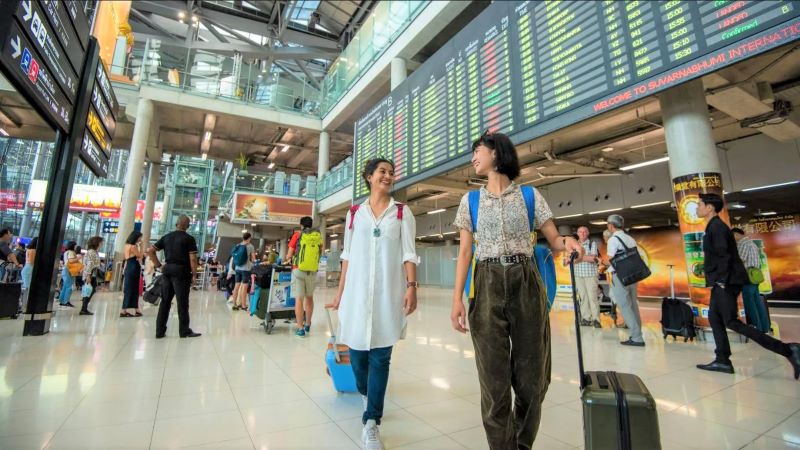 INTERNATIONAL. Car park revenues now account for over 20 percent of non-aeronautical revenue worldwide, with the ratio exceeding 40 percent in North America. Parking also consistently provides the highest EBITDA for airports, with huge growth potential.
INTERNATIONAL. Car park revenues now account for over 20 percent of non-aeronautical revenue worldwide, with the ratio exceeding 40 percent in North America. Parking also consistently provides the highest EBITDA for airports, with huge growth potential.
With airline passenger numbers set to double to 14 billion globally by 2029, the need for more airport parking is forecast to grow exponentially.
In the UK, more than 70 percent of airport parking transactions are pre-booked. This huge volume of customer data also provides clear, untapped retail growth opportunities.
With this in mind, and as part of The Moodie Davitt Report’s commitment to cover all strands of airport commercial revenues, we are delighted to introduce a new columnist who will look at growth prospects for the airport parking market.
Marie Hart is the parking specialist at global transportation consultancy company, Systra. She has over 20 years’ experience in the airport commercial sector and for many years led BAA’s multi-million pound car parking and onward travel business across seven UK airports, from contract letting to car park design and emerging technologies, including ecommerce.
She is now developing solutions and commercial strategies globally within Systra Aviation for this key non-aeronautical sector.
Hart will be sharing insights on airport car parking in her regular Moodie Davitt Report column and highlighting the opportunities and challenges that lay ahead.
Systra is a global transportation consultancy company with a presence in 80 countries, 6,200 employees and €600 million turnover in 2017. The group is headquartered in Paris, with its aviation team based in London. Aviation is a dedicated business unit within Systra, providing consulting and advisory, design and project management services to airport owners, investors, management and suppliers.

How will airports get ready for managing and parking autonomous vehicles?

By Marie Hart, director, Car Parking & Onward Travel, Systra Aviation
When you think about autonomous vehicles, or AVs as we call them, do you imagine hundreds of glass-domed pods in perpetual motion like a scene out of a sci-fi film, or perhaps a conveyor belt sushi?
Airports have always pioneered and embraced the use of automation in the movement of people but in the last year or so there has been a rapid growth in the use of AVs in the airport sector with Rotterdam The Hague airport, Gatwick, Heathrow and Groupe ADP trialling technology from baggage handling to driverless shuttles.
Indeed, one of the early driverless pods transporting passengers from car park to terminal was implemented at Heathrow Terminal 5 by one of our very own Systra Aviation team.
Even more important will be for airports to develop their strategy and charging mechanisms now to protect parking revenues and accommodate predicted growth in pick-up and drop-off volumes.
But what I am talking about is when you or I bring our self-driving car to the airport or want to rent a hire car. What will the process look like and have airports been working behind the scenes to adapt their parking and road infrastructure and technology?
The answer to that may be, “well yes we are working on it,” or more likely, “not in our next five-year business plan”, but what is clear is that this is evolution not revolution so airports will need to adapt over time. In the UK, road infrastructure, market acceptance, private ownership models and much more, will influence our adoption of AVs, so airports will need to accommodate a “mixed vehicle use” scenario for a number of years and that will need a lot of planning.
The experts tell us that car rental fleet and ride-hail Uber and Lyft will be early adopters. Many of these companies are already working on trials with the likes of Google, Apple and car manufacturers, so we need to be ready.
At airports, rather than having the predicted obsolete car parks re-imagined into concert halls and shopping malls they will need to adapt, with passengers potentially screened and checked on the way to the airport in their self-driving car.
Car parks will be adapted as hard-working storage, charging and service centres with more space and road infrastructure given over for pick-up and drop-off zones. Many owners may well send their car back home (assuming they own one) to sit on their driveway while they sit on the beach, so even more important will be for airports to develop their strategy and charging mechanisms now to protect parking revenues and accommodate predicted growth in pick-up and drop-off volumes.
This isn’t the end of airport car parking or indeed car rental, but airports need to be working on new solutions and infrastructure right now to take control and meet the pace of this paradigm shift.
If you are interested in finding out more about planning for the future contact mhart@systra.com.
Footnote: The Moodie Davitt Report is the only international aviation sector media to cover all airport consumer services, revenue-generating and otherwise.
We embrace all airport non-aeronautical revenues, including duty free and other retail, food and beverage, property, passenger lounges, car parking, hotels, hospital and other medical facilities, the Internet, advertising and related revenue streams.
Please send relevant material, including images, to Martin Moodie at Martin@MoodieDavittReport.com for instant, quality global coverage.













